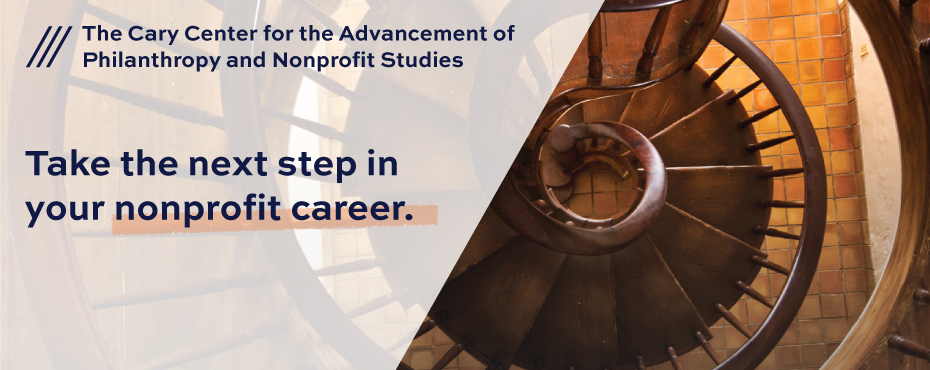
Cary Center Nonprofit Professional Certificate
The Cary Center for the Advancement of Philanthropy and Nonprofit Studies is an academic center in Auburn University’s College of Human Sciences with a focus on financial wellness, philanthropy engagement, and nonprofit studies.
The Cary Center Nonprofit Professional Certificate is offered through Merit® Nonprofit Professional Development (a product of the Nonprofit Help Center) and provides a tailored curriculum for nonprofit professionals. Students must complete the certificate in one year (365 days) or re-enroll in the certificate program at an additional cost.
Merit® is an anytime, anywhere microlearning platform just for nonprofit teams. Learners enjoy unlimited access to over 250 individual courses as they explore 28 learning paths through accessible video, audio, and text lessons, plus interactive digital workbooks, personal learning plans, an online community, and tons of support.
Capacity areas are drawn from the Impact Capacity Assessment Tool (iCAT) include leading, learning, resource-generating, managing, overseeing, and planning. Learners build skills based on the Korn Ferry Leadership Architect skill matrix
The Cary Center Nonprofit Professional Certificate is ideal for:
- Employees (full or part-time)
- Seasoned leaders
- Board members
- Volunteers
- Founders
- Philanthropists
The 1st Monday of every month is an online webinar for new enrollees. Upon successful completion of 28 learning paths, students will earn the Cary Center Nonprofit Professional Certificate (non-degreed).
These courses are grouped into the six nonprofit capacity areas measured by the organizational assessment.
Students must complete the certificate in one year (365 days) or re-enroll in the certificate program at an additional cost.
These core capacities are:
| Leading Capacity “Leading" is an organization's capacity to articulate a clear vision for itself and incentivize everyone to achieve that vision. This group of courses builds on one of every effective nonprofit's core capacities: leadership to make change happen. |
Managing Capacity "Managing" measures an organization’s ability to utilize its human and financial resources in an efficient and effective manner. These courses explore the strengths and challenges at play in nonprofit management and nonprofit leadership. |
| Learning Capacity "Learning" is a nonprofit's capacity to collect, process, and use information about its programs, operations, and external environment in order to deliver on its mission. These courses help nonprofits better understand their strengths and weaknesses in order to fulfill their vision. |
Overseeing Capacity "Overseeing" measures an organization’s ability to hold itself accountable financially and for the achievement of its impact. These courses look at the role of key stakeholders and offer a capacity building approach to improving nonprofit oversight. |
| Resource-Generating Capacity "Resource generating" is the capacity of an organization to raise the funds and other resources that it needs to operate, as well as its ability to incentivize others to support the organization in doing so. This collection of courses help nonprofits build their organizational strengths around fundraising as well as stakeholder engagement. |
Planning Capacity "Planning" measures an organization’s ability to effectively make decisions and plan for the future. These courses support the nonprofits ability in delivering results and planning for improvement. |
Registration
Each certificate course is $299.00 per registrant. The course fee includes accessible video, audio, and text lessons, plus interactive digital workbooks, personal learning plans, and an online community.
Students must complete the certificate in one year (365 days) or re-enroll in the certificate program at an additional cost.
You will make payment through AU Office of Professional & Continuing Education and then receive an email to finalize your course setup with the Merit® Nonprofit Professional Development platform.
The Cary Center Nonprofit Professional Certificate is for the entire nonprofit staff team, including part-timers, seasonal staff, new, seasoned, client-serving, back office, interns, those readying for retirement, and everyone in between. Because this platform is designed to increase and enhance the total performance of your nonprofit, we encourage our nonprofit partners to encourage every staff member to use it.
Our learning content is presented in formats suitable for all learners, including those who prefer or require video, audio-only, written, and closed-captioning.
The Cary Center for the Advancement of Philanthropy and Nonprofit Studies is an academic center in Auburn University’s College of Human Sciences with a focus on financial wellness, philanthropy engagement, and nonprofit studies. The Cary Center inspires its participants to discover their purpose through learning, giving, and growing while empowering all generations to leave an enduring legacy. The Community and Collegiate division of the Cary Center provides capacity-building resources to nonprofits to include educational programming, professional development, and networking.
The Merit® platform builds up 6 core nonprofit proficiency areas: leading, learning, resource generating, planning, managing, and overseeing. Within each of these, we look at a number of capacity areas.
- Leading proficiency: community leadership and mission-focused leadership.
- Learning proficiency: advocacy success, environmental context, staff performance assessment, organizational capacity, population needs, and program success.
- Resource Generating proficiency: board fundraising, grantmaker relationships, donor cultivation, marketing, partnership, and staff fundraising.
- Planning proficiency: decision-making and strategic planning.
- Managing proficiency: community collaboration, facilities, program implementation, staff deployment, staff professional development, staff recruitment and retention, technology, and volunteer engagement.
- Overseeing proficiency: financial oversight, impact accountability, and implementation accountability.
| Advocacy Success Board Fundraising Community Collaboration Community Leadership Decision-Making Diversity, Equity, and Inclusion Donor Cultivation Environmental Context Facilities Financial Oversight |
Grantmaker Relationships Impact Accountability Implementation Accountability Marketing Mission-Focused Leadership Organizational Capacity Partnership Performance Assessment Population Needs |
Professional Development Program Implementation Program Success Staff Deployment Staff Fundraising Staff Recruitment & Retention Strategic Planning Technology Volunteer Engagement |
For More Information
Brittany Spillman, Ed.D.
Director, Community and Collegiate Programs
Cary Center for the Advancement of Philanthropy and Nonprofit Studies
College of Human Sciences-Auburn University
210 Spidle Hall
334-844-3557
spillbl@auburn.edu
www.carycenter.auburn.edu
Last Updated: September 11, 2023

